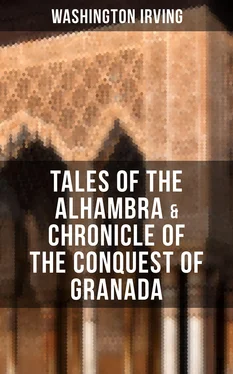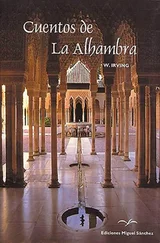Leaving Osuna at an early hour the next morning, we entered the sierra or range of mountains. The road wound through picturesque scenery, but lonely; and a cross here and there by the road side, the sign of a murder, showed that we were now coming among the “robber haunts.” This wild and intricate country, with its silent plains and valleys intersected by mountains, has ever been famous for banditti. It was here that Omar Ibn Hassan, a robber-chief among the Moslems, held ruthless sway in the ninth century, disputing dominion even with the caliphs of Cordova. This too was a part of the regions so often ravaged during the reign of Ferdinand and Isabella by Ali Atar, the old Moorish alcayde of Loxa, father-in-law of Boabdil, so that it was called Ali Atar’s garden, and here “Jose Maria,” famous in Spanish brigand story, had his favorite lurking places.
In the course of the day we passed through Fuente la Piedra near a little salt lake of the same name, a beautiful sheet of water, reflecting like a mirror the distant mountains. We now came in sight of Antiquera, that old city of warlike reputation, lying in the lap of the great sierra which runs through Andalusia. A noble vega spread out before it, a picture of mild fertility set in a frame of rocky mountains. Crossing a gentle river we approached the city between hedges and gardens, in which nightingales were pouring forth their evening song. About nightfall we arrived at the gates. Every thing in this venerable city has a decidedly Spanish stamp. It lies too much out of the frequented track of foreign travel to have its old usages trampled out. Here I observed old men still wearing the montero, or ancient hunting cap, once common throughout Spain; while the young men wore the little round-crowned hat, with brim turned up all round, like a cup turned down in its saucer, while the brim was set off with little black tufts like cockades. The women, too, were all in mantillas and basquinas. The fashions of Paris had not reached Antiquera.
Pursuing our course through a spacious street, we put up at the posada of San Fernando. As Antiquera, though a considerable city, is, as I observed, somewhat out of the track of travel, I had anticipated bad quarters and poor fare at the inn. I was agreeably disappointed, therefore, by a supper table amply supplied, and what were still more acceptable, good clean rooms and comfortable beds. Our man, Sancho, felt himself as well off as his namesake, when he had the run of the duke’s kitchen, and let me know, as I retired for the night, that it had been a proud time for the alforjas.
Early in the morning (May 4th) I strolled to the ruins of the old Moorish castle, which itself had been reared on the ruins of a Roman fortress. Here, taking my seat on the remains of a crumbling tower, I enjoyed a grand and varied landscape, beautiful in itself, and full of storied and romantic associations; for I was now in the very heart of the country famous for the chivalrous contests between Moor and Christian. Below me, in its lap of hills, lay the old warrior city so often mentioned in chronicle and ballad. Out of yon gate and down yon hill paraded the band of Spanish cavaliers, of highest rank and bravest bearing, to make that foray during the war and conquest of Granada, which ended in the lamentable massacre among the mountains of Malaga, and laid all Andalusia in mourning. Beyond spread out the vega, covered with gardens and orchards and fields of grain and enamelled meadows, inferior only to the famous vega of Granada. To the right the Rock of the Lovers stretched like a cragged promontory into the plain, whence the daughter of the Moorish alcayde and her lover, when closely pursued, threw themselves in despair.
The matin peal from church and convent below me rang sweetly in the morning air, as I descended. The marketplace was beginning to throng with the populace, who traffic in the abundant produce of the vega; for this is the mart of an agricultural region. In the marketplace were abundance of freshly plucked roses for sale; for not a dame or damsel of Andalusia thinks her gala dress complete without a rose shining like a gem among her raven tresses.
On returning to the inn I found our man Sancho, in high gossip with the landlord and two or three of his hangers-on. He had just been telling some marvellous story about Seville, which mine host seemed piqued to match with one equally marvellous about Antiquera. There was once a fountain, he said, in one of the public squares called IL fuente del toro, the fountain of the bull, because the water gushed from the mouth of a bull’s head, carved of stone. Underneath the head was inscribed:
EN FRENTE DEL TORO SE HALLEN TESORO.
(In front of the bull there is treasure.)
Many digged in front of the fountain, but lost their labor and found no money. At last one knowing fellow construed the motto a different way. It is in the forehead (frente) of the bull that the treasure is to be found, said he to himself, and I am the man to find it. Accordingly he came late at night, with a mallet, and knocked the head to pieces; and what do you think he found?
“Plenty of gold and diamonds!” cried Sancho eagerly.
“He found nothing,” rejoined mine host dryly; “and he ruined the fountain.”
Here a great laugh was set up by the landlord’s hangers-on; who considered Sancho completely taken in by what I presume was one of mine host’s standing jokes.
Leaving Antiquera at eight O’clock, we had a delightful ride along the little river, and by gardens and orchards, fragrant with the odors of spring and vocal with the nightingale. Our road passed round the Rock of the Lovers (el Penon de los Enamorados), which rose in a precipice above us. In the course of the morning we passed through Archidona, situated in the breast of a high hill, with a three-pointed mountain towering above it, and the ruins of a Moorish fortress. It was a great toil to ascend a steep stony street leading up into the city, although it bore the encouraging name of Calle Real del Llano (the Royal Street of the Plain), but it was still a greater toil to descend from this mountain city on the other side.
At noon we halted in sight of Archidona, in a pleasant little meadow among hills covered with olive-trees. Our cloaks were spread on the grass, under an elm by the side of a bubbling rivulet; our horses were tethered where they might crop the herbage, and Sancho was told to produce his alforjas. He had been unusually silent this morning ever since the laugh raised at his expense, but now his countenance brightened, and he produced his alforjas with an air of triumph. They contained the contributions of four days’ journeying, but had been signally enriched by the foraging of the previous evening in the plenteous inn at Antiquera; and this seemed to furnish him with a set-off to the banter of mine host.
EN FRENTE DEL TORO SE HALLEN TESORO
would he exclaim, with a chuckling laugh, as he drew forth the heterogeneous contents one by one, in a series which seemed to have no end. First came forth a shoulder of roasted kid, very little the worse for wear; then an entire partridge; then a great morsel of salted codfish wrapped in paper; then the residue of a ham; then the half of a pullet, together with several rolls of bread, and a rabble rout of oranges, figs, raisins, and walnuts. His bota also had been recruited with some excellent wine of Malaga. At every fresh apparition from his larder, he would enjoy our ludicrous surprise, throwing himself back on the grass, shouting with laughter, and exclaiming “Frente del toro! — frente del toro! Ah, senores, they thought Sancho a simpleton at Antiquera; but Sancho knew where to find the treasure.”
While we were diverting ourselves with his simple drollery, a solitary beggar approached, who had almost the look of a pilgrim. He had a venerable gray beard, and was evidently very old, supporting himself on a staff, yet age had not bowed him down; he was tall and erect, and had the wreck of a fine form. He wore a round Andalusian hat, a sheepskin jacket, and leathern breeches, gaiters, and sandals. His dress, though old and patched, was decent, his demeanor manly, and he addressed us with the grave courtesy that is to be remarked in the lowest Spaniard. We were in a favorable mood for such a visitor; and in a freak of capricious charity gave him some silver, a loaf of fine wheaten bread, and a goblet of our choice wine of Malaga. He received them thankfully, but without any grovelling tribute of gratitude. Tasting the wine, he held it up to the light, with a slight beam of surprise in his eye, then quaffing it off at a draught, “It is many years,” said he, “since I have tasted such wine. It is a cordial to an old man’s heart.” Then, looking at the beautiful wheaten loaf, “Bendito sea tal pan!” “Blessed be such bread!” So saying, he put it in his wallet. We urged him to eat it on the spot. “No, senores,” replied he, “the wine I had either to drink or leave; but the bread I may take home to share with my family.”
Читать дальше












